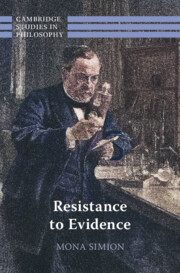Book contents
- Resistance to Evidence
- Cambridge Studies in Philosophy
- Resistance to Evidence
- Copyright page
- Dedication
- Contents
- Acknowledgements
- Introduction
- Part I The Epistemology and Psychology of Resistance to Evidence
- Part II Resistance to Evidence and Epistemic Proper Function
- Part III Theoretical Upshots
- Concluding Remarks
- Bibliography
- Index
- References
Bibliography
Published online by Cambridge University Press: 16 February 2024
- Resistance to Evidence
- Cambridge Studies in Philosophy
- Resistance to Evidence
- Copyright page
- Dedication
- Contents
- Acknowledgements
- Introduction
- Part I The Epistemology and Psychology of Resistance to Evidence
- Part II Resistance to Evidence and Epistemic Proper Function
- Part III Theoretical Upshots
- Concluding Remarks
- Bibliography
- Index
- References
Summary
- Type
- Chapter
- Information
- Resistance to Evidence , pp. 197 - 214Publisher: Cambridge University PressPrint publication year: 2024
- Creative Commons
- This content is Open Access and distributed under the terms of the Creative Commons Attribution licence CC-BY-NC 4.0 https://creativecommons.org/cclicenses/

